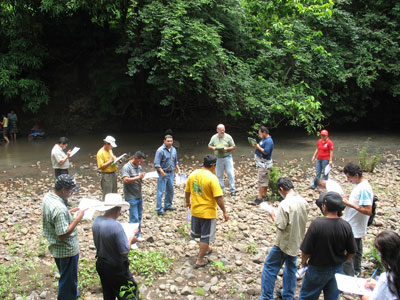El Salvador creates a National Platform for Disaster Risk Reduction

Foto: © SNET
The Salvadoran Platform for Disaster Risk Reduction was established with the purpose of developing disaster risk reduction policies and guiding development so that it takes into account measures for risk reduction and actions for disaster prevention, while fulfilling the commitments made at the World Conference on Disaster Reduction, held in Kobe, Japan.
The National Platform was created as the result of the efforts made by a number of national institutions involved in risk reduction and disaster prevention in El Salvador, and through a broad-based discussion process, by which it was agreed upon that, initially, all institutions that belong to the CEPREDENAC1 National Commission would make up the base of the National Platform.
In this context, the National Platform was launched on July 1 6, 2008, and comprises a representative group of government institutions. In early 2009, civil society organizations and the United Nations Development Program (UNDP) were also included. This strengthened and maximized the potential of the National Platform to become a high-level mechanism for formulating social and economic proposals for disaster risk reduction.
The following are some of the government institutions that participate in the National Platform: the Ministries of Education, Public Health and Social Assistance, National Defense, Agriculture and Livestock, Foreign Affairs through the Technical Secretariat of the President’s Office, Interior through the General Civil Protection Office, and Environment and Natural Resources through the General Bureau of the National Service for Territorial Studies.
In accordance with its action plan, the Salvadoran Platform serves as a mechanism for promoting disaster risk reduction (DRR) at different levels. In this capacity, it coordinates, analyzes and advises on priority areas that require a participatory and collaborative process.
The National Platform expects to become the coordinating mechanism for mainstreaming DRR into development policy, planning and programs, in line with the implementation of the Hyogo Framework for Action (HFA). The goal is to contribute to establishing and developing a broad-based national system for disaster risk reduction, complemented by the CEPREDENAC National Commission and the Civil Protection National Commission.
Drawing on this vision, the initial group that comprises the Salvadoran National Platform requested that other institutions working on risk reduction be included, such as national and international cooperation agencies. Thus, the NGO “Geologists of the World” (Spain), the United Nations Development Program (UNDP/El Salvador), the Ministry of Treasury, the private sector, university representatives and the Foundation for Economic and Social Development (FUSADES) are now part of the Platform.
To date, the work done by the National Platform has focused on creating and consolidating this group of institutions and organizations, and developing mechanisms, work proposals, guiding principles and a vision for the future, based on the UNISDR guidelines for establishing National Platforms.
Among the most significant contributions to date, it is worth mentioning the review of the country report, in line with the actions proposed by the Hyogo Framework for Action 2005-2015, and fostering a proposal for integrating other sectors of the Salvadoran society, as well as institutions working on economic and social development issues, into the National Platform.
This year, one of the activities carried out by the National Platform was the review of the Mitch+10 Country Report in July 2009, through a broad-based participatory process. Additionally, the Platform provided technical input to the First National Report on the Status of Risk and Vulnerability in El Salvador, which is expected to become a tool for technical and political management among all sectors in the country.
Among the activities planned by the National Platform in the near future, it is worth mentioning the development of a proposal for political instruments for disaster risk reduction, the design of strategies for promoting the participation of different stakeholders, and the management of resources available for further implementation of the actions set forth by the Hyogo Framework for Action.
In addition, the Platform is considering the holding of high-level forums in the future, as a space to participate and exchange information and lessons learned on risk reduction.
Finally, the Platform plans to put in place mechanisms for incorporating risk reduction into economic and social development policy, and for mobilizing resources so that its activities are sustainable. Likewise, the Platform will be promoted as a technical space for discussion among its member institutions, in order to exchange information, generate specific proposals, and produce results nationwide.
For further information about the Salvadoran National Platform for Disaster Risk Reduction, please contact Ernesto Durán, institutional liaison, at fduran@marn.gob.sv, telephone number 2267-9522. Also, please visit www.snet.gob.sv.





